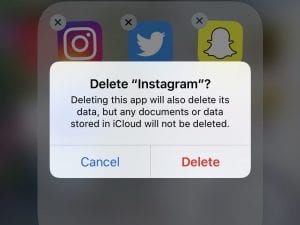By: Annabelle Blake, Edited by: Megan Montgomery
Social Media Cleanse Series
When presented with the opportunity to do a media cleanse, I was up for the challenge. I’ve done many social media detoxes in the past, but I have never taken a cleanse as far as eliminating texting and internet use on my phone.
So on a Sunday morning, when I was feeling particularly overwhelmed by the effects of social media, I deleted all the apps on my phone. I had every intention of starting my media cleanse, but logging out of the apps was only the beginning. This hiatus lasted about twenty minutes until I got my first text: a friend saying “Hi,” intending to start a conversation.
While the social media apps were deleted from my phone for seven days, I continued to stay in contact with friends via texts and phone calls. I began to wonder why it was so easy for me to delete the social networking apps, but when it came to the reality of missing out on communication with my friends via texts or phone calls, I just couldn’t bring myself to do it.
We, as college students, communicate with the people in our lives in many ways, and the constant exposure to media is changing our relationships.
Communication researchers, Dong Liu and Chia-Chen Yang, conducted a meta-analysis in which they analyzed the results of research studies on computer-mediated communication. Their study, published in The Journal of Computer-Mediated Communication, explored how people in different types of relationships (friendships, romantic relationships, acquaintances) interacted online and whether the means of communication (cell phone call; text; IM; Social Networking Sites, or SNS, use) correlated with how close they are to one another.
In the study, the researchers found that both texting and calling had stronger associations with the feeling of closeness. Because of these feelings, the people predominantly using these channels considered themselves close friends. In turn, this means that communication via IM and SNS occurred between people who identified as feeling less close with the person they communicate with.
Throughout my social media cleanse, I experienced many of the feelings Liu and Yang write about in their article. I felt the desire to communicate with my close friends via text or call, but friends I communicated with over social media seemed to disappear from my mind. By stepping away from social media, I was made aware of friends I truly felt close to, compared to surface-level friends I only talked to on Snapchat or Instagram.
This desire for communication led me to examine the way I interact with my close friends and how media – or the lack thereof – affects our other interactions.
In a study published in the Review of Communication, communication researchers, Lloyd Pettegrew from the University of South Florida and Carolyn Day at Savannah College of Art and Design, surveyed college students to determine their media usage and the effect it has on their relationships.
The study showed that while mobile devices do help develop closer relationships, they also hinder that feeling of connection. Pettegrew and Day found that “three-in-four communication students believe that mobile devices have greatly or moderately altered the way they conduct interpersonal communication with friends.”
I witnessed the way mobile devices alter communication firsthand when my time with friends was interrupted by phone calls, text messages, and constant social media notifications. These notifications interrupted my friends who were not on a cleanse and distracted from our conversation. Meanwhile, I was left in the dark wondering what was so important that I was missing out on.
After analyzing the studies, I believe they provide a very real glimpse into what college students face in this time of technological overload. We oftentimes communicate with our closest friends via text message or phone call, but we interact with so many other acquaintances – even strangers – on a daily basis via SNS. So, how does this affect our relationships with our closest friends?
From my experience, logging out of my social media accounts allowed me to focus on the people around me and the friends who I talk to on a regular basis. I was not distracted by the pictures posted by acquaintances or strangers that I follow on Instagram. In contrast, I did miss out on shared posts and popular culture references – even after only one day – which contributed to that all too familiar sense of missing out.
My friends have recently been using the saying “hang up and hang out.” While we use this saying as a joke, it is a good reminder that the conversations that we have in person can’t be replaced. As human beings, we have a desire for interpersonal communication and a very real fear of missing out. While our phones tend to be our lifeline, they can only provide us with so much connection.
While some might view my media cleanse as a failure, because I couldn’t stand the idea of not speaking with my friends for a few days, I took away many important messages. Messages like: close friendships do make my life better, and I have always had a slight addiction to my phone. This all changed when I thought about not being able to talk to some of my closest friends for a few days.
The overwhelming takeaway: I can handle a missed pop culture reference or good meme, but missing out on relational closeness is too big of a sacrifice for me.
